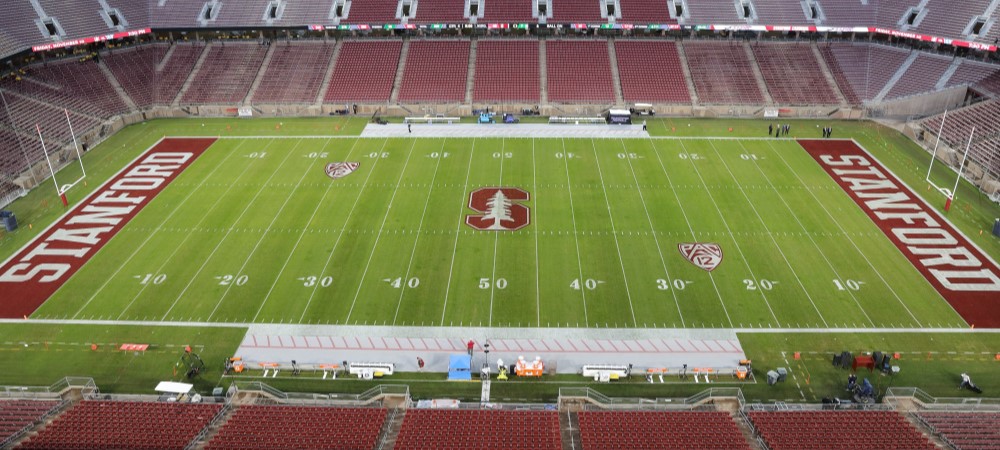- The Big Ten and PAC-12 conferences have announced that their members will be playing exclusively conference games in Fall 2020.
- Other conferences will make their own decision on non-conference games in late July, but it is likely that nonconference games will either be limited or eliminated entirely.
- The loss of nonconference games could cost sportsbooks nearly $700 million in betting handle and nearly $50 million in revenue.
- Some of those losses would be mitigated if conferences decide to expand their conference schedules, or if the College Football Playoff expands to eight teams.
- No matter what happens, there will almost certainly be a 2020 college football season, as not playing would leave billions of dollars on the table.
INDIANAPOLIS – Last week, the Big Ten and PAC-12 conferences announced that their members would be playing a conference-only football schedule in 2020. If other conferences take a similar approach, it could cost sportsbooks hundreds of millions of dollars.
On Monday, all 14 SEC athletic directors met in Birmingham to discuss the future of the 2020 college football season. While they didn’t decide on a concrete plan, they are set to make a final decision by the end of July, alongside the ACC and Big 12.
It is likely that all Power Five conferences will decide on a similar conference-only approach, and it is possible that leagues could decide to delay the start of the season by a few weeks or months.
If every FBS conference decides to only play conference games in 2020, it would result in a loss of 300-350 total football games—a massive blow to betting volume for sportsbooks. There are roughly 900 FBS football games every year, meaning that nonconference games account for over a third of all games.
No matter how you slice it, a conference-only schedule would be a huge blow to college football betting revenues.
Exactly How Much Money Will Be Lost Nationwide?
Conservative estimate:
- $680 million in lost betting handle
- $46.6 million in lost sports betting revenue
- $6.1 million in lost tax revenues
Methodology:
With so many unknown variables, it is difficult to come up with an exact dollar figure for how much money sportsbooks will lose. To create an estimate, the first thing to do is to look at what percentage of wagers during football season are specifically for football.
In Nevada, the most established sports betting market in the United States, football accounted for 60.4% of all sports wagers placed between September and January—the duration of the college football season. Jimmy Vaccaro, a bookmaker in New York, claimed in 2017 that college football generally accounts for about 40% of total football wagers. His claim can’t be verified because sportsbooks don’t split college and pro revenue, but it provides a good starting point.
Even using a conservative estimate of a 65-35 split, college football would account for 21.1% of all sports betting handle between the months of September and January. During the 2019-2020 college football season, that would have meant $1.74 billion in total college football wagers.
In other words, if nonconference games were eliminated, nationwide betting handle might have been reduced by as much as $680 million. Using the national average hold rate of 6.86%, that would mean a net revenue loss of $46.6 million for all sportsbooks.
Nationwide, sports betting revenue is taxed at an average rate of 13.07%, meaning that the loss of college football non-conference games could also cost state governments as much as $6.1 million collectively.
Keep in mind that these estimates are conservatively based on 2019 sports betting revenue data. The legal sports betting market has evolved greatly since September 2019, and the actual figures could be much higher.
What Happens If The Season Is Canceled Entirely?
The NCAA does not have the authority to unilaterally cancel the football season the way they can with non-revenue sports, but there is a possibility that the public health situation could deteriorate to a point where playing games is deemed too great a risk.
This decision would likely be made piecemeal by individual conferences or even individual programs. The Ivy League schools already set a precedent for this by announcing the cancellation of all sports until January 2021. The Patriot League followed shortly after.
At the top levels of college football, however, this is unlikely. One anonymous source at a Big Ten school said that it is “highly likely” that the Power Five conferences will still play in 2020.
When asked why, he replied, “Too much $$.”
Smaller conferences, especially those without football, will likely follow the Ivy League and Patriot League in canceling Fall sports, but for major football schools, there are tens or hundreds of millions of dollars at stake.
Major college athletic departments are built on the financial foundation of football, and the loss of even one football season would have disastrous consequences. No matter how bad things get, there will almost certainly be football either in the Fall or in the Spring.
What Happens If Leagues Extend Conference Play?
If conferences decide to uniformly extend conference play to 10 games, as some have speculated, that would amount to 615 total games for the season, excluding teams that aren’t members of any conference.
Some have pointed out that keeping schedules conference-only would not reduce travel in many instances, but it would at least make it easier to monitor and standardize testing procedures.
Extending the conference season could also create room for leagues to temporarily or permanently adopt independent teams into their ranks, which would further increase the number of games played. The ACC would likely incorporate Notre Dame into its revised 2020 conference schedule, for example.
Other possibilities include Brigham Young University joining the Mountain West Conference, or Army West Point joining the American Athletic Conference, which houses the Naval Academy and currently has an odd number of members.
More conference games would be a boon to sportsbooks, especially if they involve a major brand like Notre Dame.
Could More Conference Games Inflate Sportsbook Revenues?
While top nonconference games draw massive viewership numbers and betting volume, many nonconference games are designed to be noncompetitive. Major programs often pay smaller programs huge fees for “guarantee games”, which are intended to be easy wins for the bigger school.
Interest in these games is usually very low outside of local markets, and the betting lines are often lopsided and unappealing.
With more conference games, which would presumably be more competitive games on average, sportsbooks could increase their per-game betting volume even as the total number of games decreases.
A new conference game between Texas A&M University and the University of Florida, for example, would likely drive much more fan interest and betting action than A&M’s currently scheduled nonconference games against the University of North Texas and Abilene Christian University.
With lucrative broadcasting rights fees on the line, expect there to be both internal and external pressure on conferences to schedule as many games as possible.
Possibility Of Expanding The College Football Playoff
On a recent segment of the Paul Finebaum Show, ESPN analyst Brad Edwards speculated that the College Football Playoff could expand to eight total teams this season in the event that only conference games are played.
This would greatly benefit sportsbooks, as College Football Playoff games are massive betting draws for fans all across the country.
With so many other games likely to be canceled, an expanded playoff would be a great way for both sportsbooks and TV networks to recoup lost revenues.
Conclusion
It seems increasingly likely that if college football games are played this fall, games will be intra-conference only. This could have a massive negative impact on sports betting revenues.
Alternatively, a few small scheduling adjustments could help create more competitive football games this fall and increase interest in college football betting even with hundreds of fewer games played.
As with everything else right now, it is difficult to accurately project the future because there is so much uncertainty surrounding the economy, the public health situation, and general public behavior.
Advertising Disclosure
In order to provide you with the best independent sports betting news and content LegalSportsBetting.com may receive a commission from partners when you make a purchase through a link on our site.
News tags: ACC | American Athletic Conference | Army West Point | Big 12 | Big Ten | Brigham Young University | Conference-USA | FBS Independents | Football Bowl Subdivision | Mid-American Conference | Mountain West Conference | Pac 12 | SEC | sports betting revenue | Sun Belt Conference

With a dual background in English and sports performance and business analytics, Carter aims to write stories that both engage and inform the reader. He prides himself on his ability to interweave empirical data and traditional narrative storytelling. When he isn’t keeping readers up to date on the latest sports betting legal news, he’s banging his head against a wall regretting his decision to be a Tampa Bay Buccaneers fan.


 Bitcoin Sports Betting Sites
Bitcoin Sports Betting Sites Best Online Sports Betting
Best Online Sports Betting Famous Sports Bettors
Famous Sports Bettors States With Legal Sports Betting
States With Legal Sports Betting Sports Betting Events
Sports Betting Events




